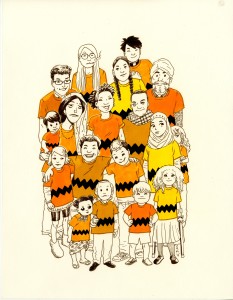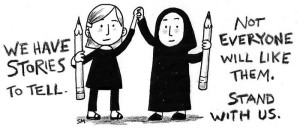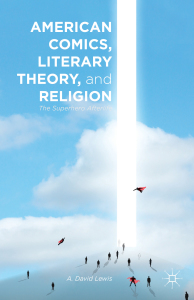
Carla Speed McNeil
Click to enlarge.
Special thanks to Carla Speed McNeil for sharing this with us.

Click to enlarge.
Special thanks to Carla Speed McNeil for sharing this with us.
The following is a public statement by the Sacred and Sequential group:

Nothing can justify the attack on the French satirical magazine Charlie Hebdo on January 7, 2015. Some of the cartoons published by the magazine were offensive and at times deemed Islamophobic, but that in no way legitimates violence. Charlie Hebdo had the right to publish what it did under the protection of free speech. Just as freedom of speech did not guarantee the victims of the attack immunity to criticism, the right to dissent does not include murder.
In the aftermath of yesterday’s killings, the response has been varied. New Yorkers took to Union Square to offer their support in an impromptu vigil. Cartoonists such as Sarah McIntyre and Carlos Latuff, politicians such as Barack Obama and David Cameron, and pundits across the planet have offered their support and condolences to the victims’ loved ones. Among those who have voiced their sadness and outrage are Muslim individuals and organizations from all over the world, such as the Union of Islamic Organizations of France, the Council on American–Islamic Relations (CAIR), and the Ahmadiyya Muslim Community USA.
Others’ responses have been of a more combative tenor. Internationally, and on a far too familiar pattern, an imaginary “Islam,” simplistically conceived as a monolithic, murderous, West-hating, and terrorist ideology, has been blamed for the attacks. In some places, the response has not been limited to words but has spilled over into violent acts perpetrated against a number of sacred spaces and places of worship. Several French mosques and Muslim prayer halls have been subject to attacks, placing many innocent worshipers in the line of retaliatory fire for the actions of a select few.
“Islam” did not do this; adherents to a particular, marginal, and extreme interpretation of what Islam is and what it means to be a Muslim did. They do not represent the planet’s more than one billion self-identifying Muslims. Neither the Qur’an nor the traditions attributed to the Prophet of Islam uniformly oppose illustrations nor modern comics and cartooning. Moreover, wherever and however they are published, comics as a medium has no innate aversion to religion but, instead, is a fertile site of opportunity and engagement with all faiths and beliefs. We must conclude that these events cannot be attributed to Islam as a religion nor to comics as a medium. Protecting this art and its artists is just as necessary as protecting Islam and Muslims from reduction to ideological extremism.
 First, Jordan Mechner gave us Prince of Persia, the highly successful video game (and less successful movie, at least domestically). Then, in 2013, Mechner resumed completing his 2010 graphic novel with LeUyen Pham and Alex Puvilland. The result was First Second Books’ Templar — what Boing Boing writer (and fellow graphic novelist of In Real Life) Cory Doctorow described as
First, Jordan Mechner gave us Prince of Persia, the highly successful video game (and less successful movie, at least domestically). Then, in 2013, Mechner resumed completing his 2010 graphic novel with LeUyen Pham and Alex Puvilland. The result was First Second Books’ Templar — what Boing Boing writer (and fellow graphic novelist of In Real Life) Cory Doctorow described as
…a conspiracy thriller about the treasure of the Knights Templar, an order of Crusaders who were persecuted by the King of France in the early 1300s…
Karin L. Kross at Tor.com evaluated Templar as “a heist in the best tradition of Ocean’s Eleven and The Italian Job.” Read Mechner’s own account of the completed hardcover here.
 Approximately one year ago, Debbie Schlussel — a “conservative political commentator, radio talk show host, columnist, and attorney” with “unique expertise on radical Islam/Islamic terrorism” according to her bio — posted her views on the debut of Ms. Marvel under the title, “Marvel Comics Adds Muslim Chick Superhero (to Appease Marvel’s Muslim Chick Editor).”
Approximately one year ago, Debbie Schlussel — a “conservative political commentator, radio talk show host, columnist, and attorney” with “unique expertise on radical Islam/Islamic terrorism” according to her bio — posted her views on the debut of Ms. Marvel under the title, “Marvel Comics Adds Muslim Chick Superhero (to Appease Marvel’s Muslim Chick Editor).”
Schlussel relays:
No word on how many gay Arafats she’ll pretend to sleep with either. How many Fort Hoods she’ll shoot up or bras she’ll rig with explosives to blow up planes.
According to our records, so far, a year later, the score remains:
Gay Arafats: 0
Ft Hoods: 0
Rigged bras: 0
One commenter warned Marvel, “get ready to incur the Muslim wrath” due to their publishing Ms. Marvel.
Add to the scoreboard:
Muslim wrath over Ms. Marvel: 0
(Thanks to Martin Lund for noting this piece!)
 This week sees the debut of S&S Founding Member A. David Lewis’s American Comic Books, Literary Theory, and Religion: The Superhero Afterlife. Based on both his doctoral work from Boston University and his American Academy of Religion (AAR) presentations, Lewis, co-editor of both Graven Images: Religion in Comic Books & Graphic Novels and Digital Death: Mortality and Beyond in the Online Age, delivers his first solo monograph in Comics Studies. Read more here.
This week sees the debut of S&S Founding Member A. David Lewis’s American Comic Books, Literary Theory, and Religion: The Superhero Afterlife. Based on both his doctoral work from Boston University and his American Academy of Religion (AAR) presentations, Lewis, co-editor of both Graven Images: Religion in Comic Books & Graphic Novels and Digital Death: Mortality and Beyond in the Online Age, delivers his first solo monograph in Comics Studies. Read more here.